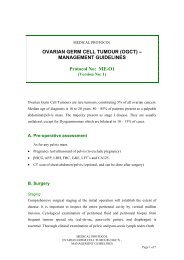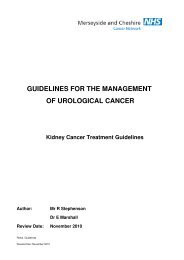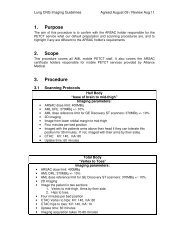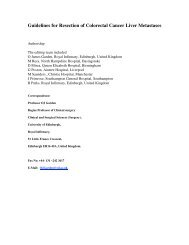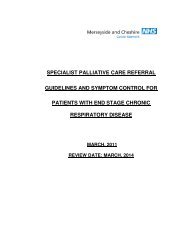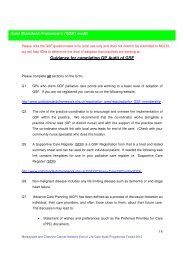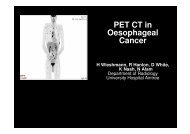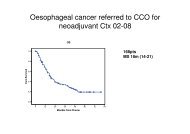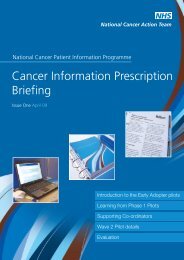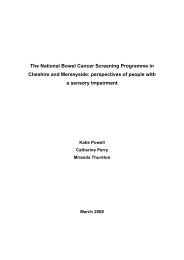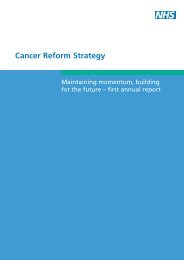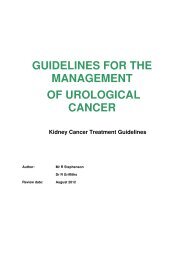Cancer Reform Strategy - NHS Cancer Screening Programmes
Cancer Reform Strategy - NHS Cancer Screening Programmes
Cancer Reform Strategy - NHS Cancer Screening Programmes
- No tags were found...
Create successful ePaper yourself
Turn your PDF publications into a flip-book with our unique Google optimized e-Paper software.
54 CANCER REFORM STRATEGYBox 12: Young people and cancerIn March 2007, Teenage <strong>Cancer</strong> Trust held its annual ‘Find Your Sense of Tumour’ conference forteenagers and young people with cancer, where they discussed their experiences of beingdiagnosed with cancer. Of the 360 teenagers and young people surveyed at the conference,47% had visited their GP with symptoms four or more times before being referred to aspecialist.The survey question: How many times did you visit your GP with symptoms before you werereferred to a specialist?Answer: Once – 26%; two to three times – 27%; four to five times – 13%; and more than fivetimes – 34%3.59 However, several of the groups convenedto inform the development of the <strong>Cancer</strong><strong>Reform</strong> <strong>Strategy</strong> felt that more should be doneto support primary care professionals in spottingpotential cancer symptoms, accessing theappropriate diagnostic tests and making referralsto secondary care quickly when necessary. Thereis scope to go beyond checklists of the mostsignificant symptoms to more sophisticateddecision making tools which assess individualpatients’ risk of having, or getting, a specificcancer. NCRI will be exploring what researchis needed in this area.Improving access to diagnostics3.60 Improving access to diagnostics is thesingle most important priority in primary care toimprove the early diagnosis of cancer. Greateraccess is needed both to diagnostic tests forinitial investigations, mainly to exclude cancerand to specialist diagnostic services for patientswith a high chance of having cancer. GPs,working to agreed protocols, need to be able tosend patients for initial investigations such asMRI and CT scans, endoscopies and X-rays ifthey are concerned that cancer may be apossible diagnosis. This issue also forms animportant component of the <strong>NHS</strong> Next StageReview. Chapter 7 sets out some of the ways inwhich access to diagnostic services could beimproved and diagnostic capacity increased.National audit in primary care ofnewly-diagnosed cancers3.61 Missed diagnosis of cancer has beenidentified as an important issue by theNational Patient Safety Agency (NPSA).We now need to understand more aboutthe nature and extent of delays in cancerdiagnosis. Many GPs are alreadyundertaking ‘significant event reviews’regarding the diagnosis of cancer. We wishto build on this to establish a NationalAudit in primary care of all patients newlydiagnosed with cancer. The audit will beundertaken in collaboration with the RoyalCollege of General Practitioners (RCGP)and the NPSA.3.62 The RCGP and NPSA will be asked toconsider and develop the best auditmethodology. This audit will need to look ataspects such as:●●●The number of visits to primary care withrelevant symptoms before referral to hospital(delay pattern analysis);The interval from first attendance to referralor definitive diagnostic test; andExamining clinical practice against criteria forreferral and prioritisation.



